It’s issue #2 of the new series by Film Trap writer Chloë Brett: “The Most Important Movie In The World”! In her last article she talks about Frances Ha as a significant story in her life. In this issue she branches out and chats with her friend Lee about why RoboCop is so important to him.
By Chloë Brett
I first met Lee through a friend about four years ago and though we’ve only hung out a handful of times I know him to be a pretty analytical and thoughtful guy, which is why I was somewhat taken aback when he listed of Paul Verhoeven’s 1987 sci-fi classic “RoboCop” as one of his favourite films.
Though I can’t for sure say the exact first time I ever saw “RoboCop” it’s a movie that I feel has always been swimming around in my brain. I think what probably happened was that I saw “RoboCop 2” when I was a kid and then through various bits of pop culture got confused and assumed I had also seen the first one. I know I for sure watched it as a teenagers, two of my friends loved quoting that classic Kurtwood Smith line, “Bitches, leave”, and I’m sure I watched it again a few years ago when I picked up a copy on Blu-ray.
With each viewing of RoboCop my general thoughts tended to be:
- “Is Peter Weller handsome?”
- “The stop motion in this movie is so cool.”
- “Nancy Allen is so cool.”
- “The effects are so cool.”
- “Wow, that guy just melted!”
So basically it was a movie I liked a lot but never really thought about too deeply. After giving it another watch to prep for this I can tell you without a doubt, there is a lot going on in this movie and the more Lee and I talked, the more I got to understand why to him “RoboCop” is one of the most important movies in the world.
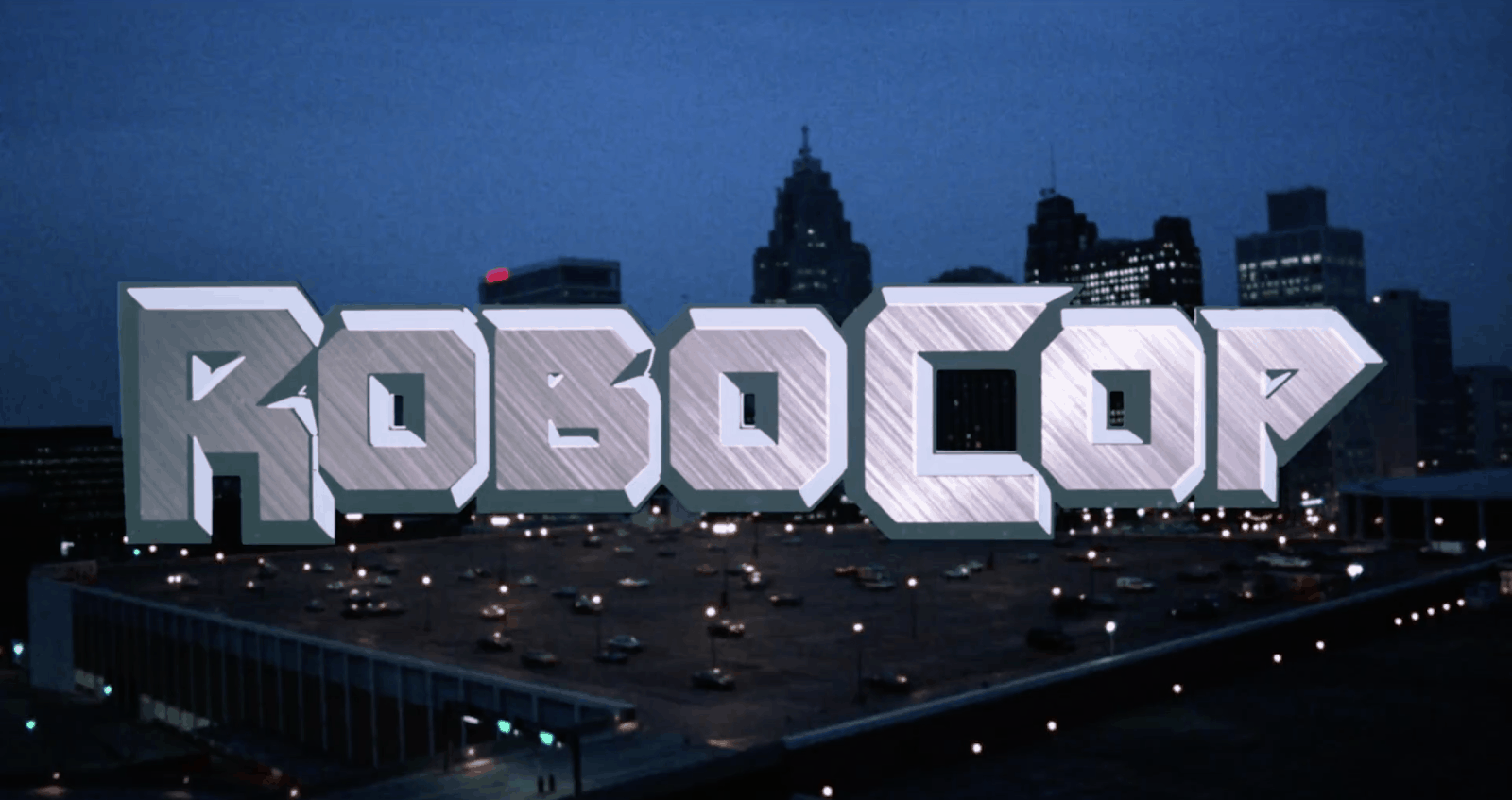
CHLOË: So before we get into your specific movie pick can you tell me a bit about your general relationship to film? Are you a film junky, casual watcher?
LEE: I think I grew up a very casual viewer of movies. Growing up in a fairly uncultured, working class household meant I wasn’t exposed to a lot of “film”. Since college, though, I’d say I became a much more avid watcher of films, but that blue collar attitude kind of persisted in the form of my tastes. For the past two years, I’ve been thinking much more critically about film, mostly because as a writing exercise, I’ve been reviewing everything I watch.
C: You rhymed off a couple films when we initially talked about doing this, but ultimately you settled on the 1987 sci-fi classic “RoboCop.” When I was re-watching it last night I had this image of little Lee sitting glued to a TV watching people getting there hands blown off.
L: That’s a fun image, for sure!
C: Do you recall how old you were the first time you saw it?
L: To be honest, I don’t! Because of my age, I was born in 1985, I was aware of “RoboCop” as a media property long before I ever saw it. I remember encountering “RoboCop” toys, the licensed Marvel comics, and maybe even the animated series before I had a sense of the content of the film. I do have the sense that I first watched the movie in high school, and in the intervening years my appreciation for it has kind of mutated and deepened.
C: Oh, for sure. I assumed I saw it when I was a kid but it also could have just been the subsequent merch that floated around for years. There’s also so much stuff I thought I had seen merely based on “Simpsons” references.
L: That’s definitely an affliction of mine as well. “The Simpsons” was a real pop-cultural mine. I mean, I’d basically seen “Citizen Kane” before I’d seen “Citizen Kane.”
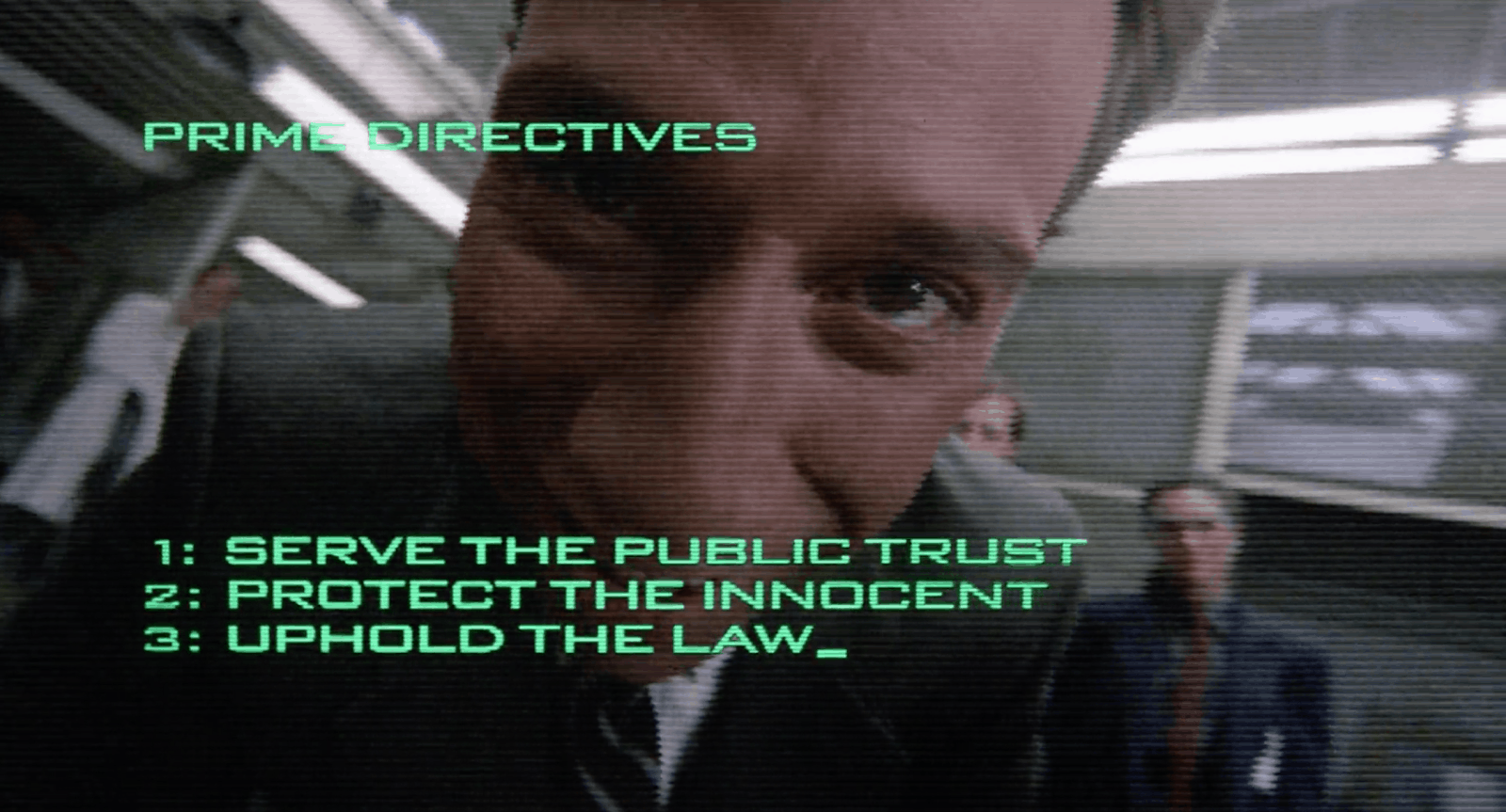
C: (Laughing) Yes! So what is it about “RoboCop” that makes it one of your all time favourite movies? I know that’s a big question.
L: The last few times I’ve watched it, I’ve developed a kind of theory about my bond with the movie. That I’ve grown with it, and because of that, my faculties for appreciating it have opened it up to me and made it this very dear thing. Like, on initial viewing, associating it with this kind of hokey commercial product, I was mostly just swept up in the violence and cool factor. I’ve never understood car culture – my dad was an auto-body repairman and it was a pretty big part of his life – but I think I got some of the same thrills from the cool sleekness of RoboCop himself. As my priorities and personality and values have changed, it’s become apparent that there’s so much more there.
I felt a lot of that reflected in the idea of what a RoboCop is, that on the outside he is this pinnacle of masculinity, but inside he’s all been striped away.
C: I think last night was probably my third or fourth time watching “RoboCop” and I totally agree that it sort of evolves each time you watch it. Obviously the stop motion animation and gore are a really fun aspect of it but this time I was a lot more focused on the characters and their journeys. And there really is a lot there.
L: Absolutely! My sort of second layer of enjoyment of it was predicated on being an angry young man, kind of that circa-“Fight Club” moment where satire and social commentary became something that was a larger part of my constructed teenage identity. And so the media breaks, those amazing commercials and news clips, became sort of a back-patting, I-get-this, haughty facet. But now, like you said, I’m way more drawn to the opera and drama of it.
C: I love those movies that when you’re younger, like you said, you feel like “Oh man, I totally get this. Consumerism and crime. Whoa, I’m deep.” But then you get older and it’s like, “My god, this man has been turned into a monster and lost his whole life.”
L: Exactly. And maybe part of this is that I’m now an adult, probably not far from Peter Weller’s age when they made the film, but that loss of a soul, that feeling of being abject and lost and broken, it’s crushing. So much of that is the lead performance and the direction, a lot of it is Basil Pouldouris’s score, which is just enormously moving. But it’s a very human story, inside this very dehumanizing puzzle-box kind of construction.
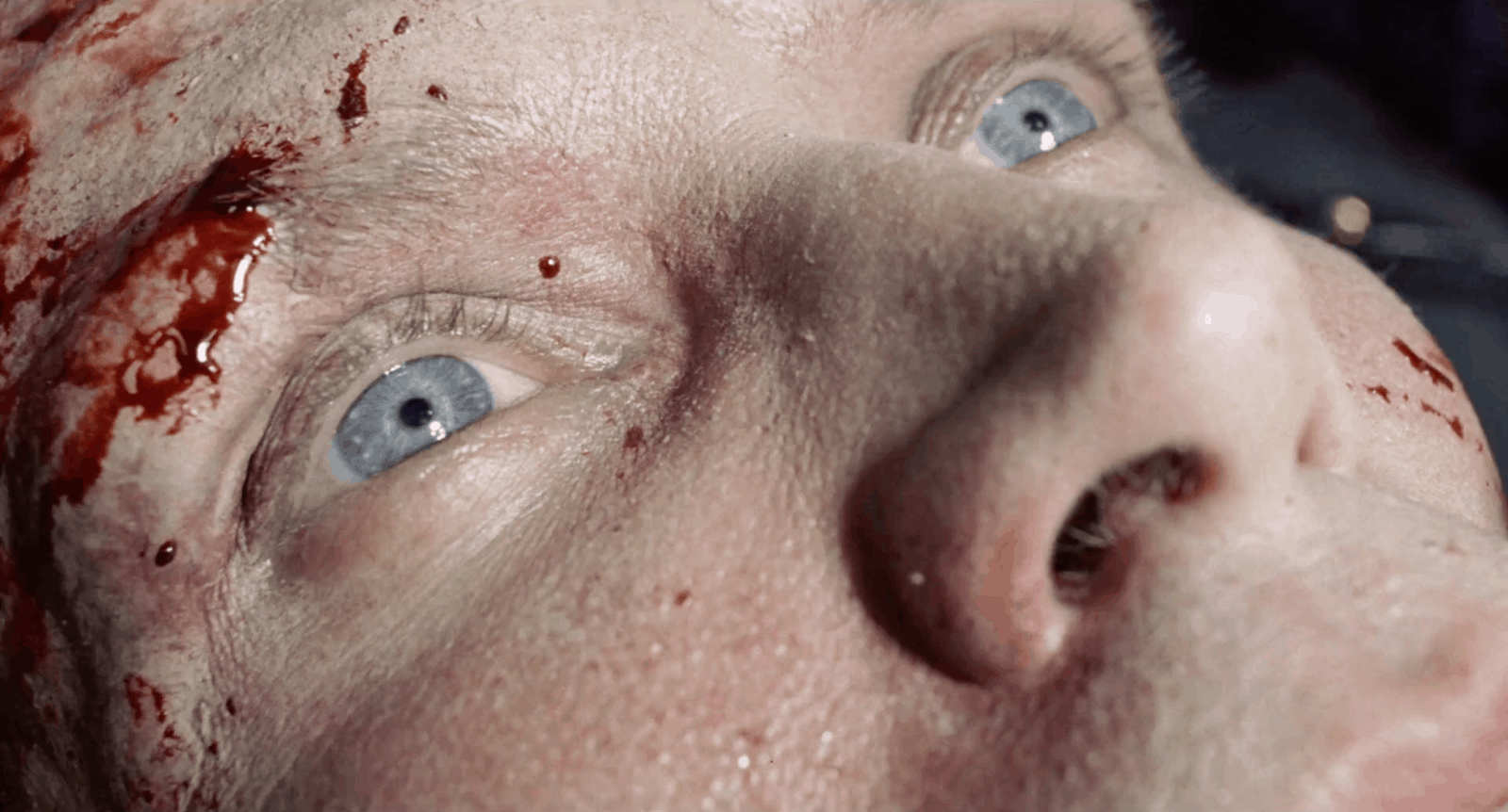
C: I was recently watching “Pop Culture Detective” and his most recent video was on the idea behind the Jedi and how it’s a terrible message for men: That they need to disconnect with emotion and relationships in order to be successful, that love leads to fear and fear to evil. I felt a lot of that reflected in the idea of what a RoboCop is, that on the outside he is this pinnacle of masculinity, but inside he’s all been striped away.
L: That’s funny, I was just thinking of a “Star Wars” parallel last night as well, but a different one. I think that the appeal of Murphy (Peter Weller), of the RoboCop character, is that he’s incorruptible. And yes, what makes him good, in that manichean sense, is that he’s being reconnected to his emotional inner life. And, I mean, another element of the RoboCop as masculine icon thing is his literal emasculation. In the scene where Murphy is being essentially harvested, they say this haunting, bureaucratic phrases, I can’t stress enough how well-written this thing is, “full body prosthesis.”
C: And then they replace it with a gun that comes out of his leg.
L: Very freudian!
C: There’s a lot of gun/phallic metaphors going on in this movie. Especially with the very brief glimpses we get of Murphy’s relationship to his son.
L: I love how sort of brief and elliptical our glimpses of Murphy’s family are. I think it would be cruel to shoehorn them into the plot, to not give that thread room to breathe. I love how there’s this through-line, as well, from his son to Lewis (Nancy Allen). He bonds with Lewis through this private joke borne of a real human motivation: To be a role model to his son. And then that same gun-twirling gesture is what sets in motion Lewis’s attempts to connect with him.
C: Absolutely! I don’t know if you’ve seen the 2014 remake but the family is very present in the film which sort of derails the whole thing, for me at least. Having his family be memories that guide him back is way more effective then having someone screaming in his face to remember them. It really doesn’t have the same heart or emotional resonance as the original. I can’t even remember if it has a Lewis or Lewis like character. Which is insane because she is so important in his journey.
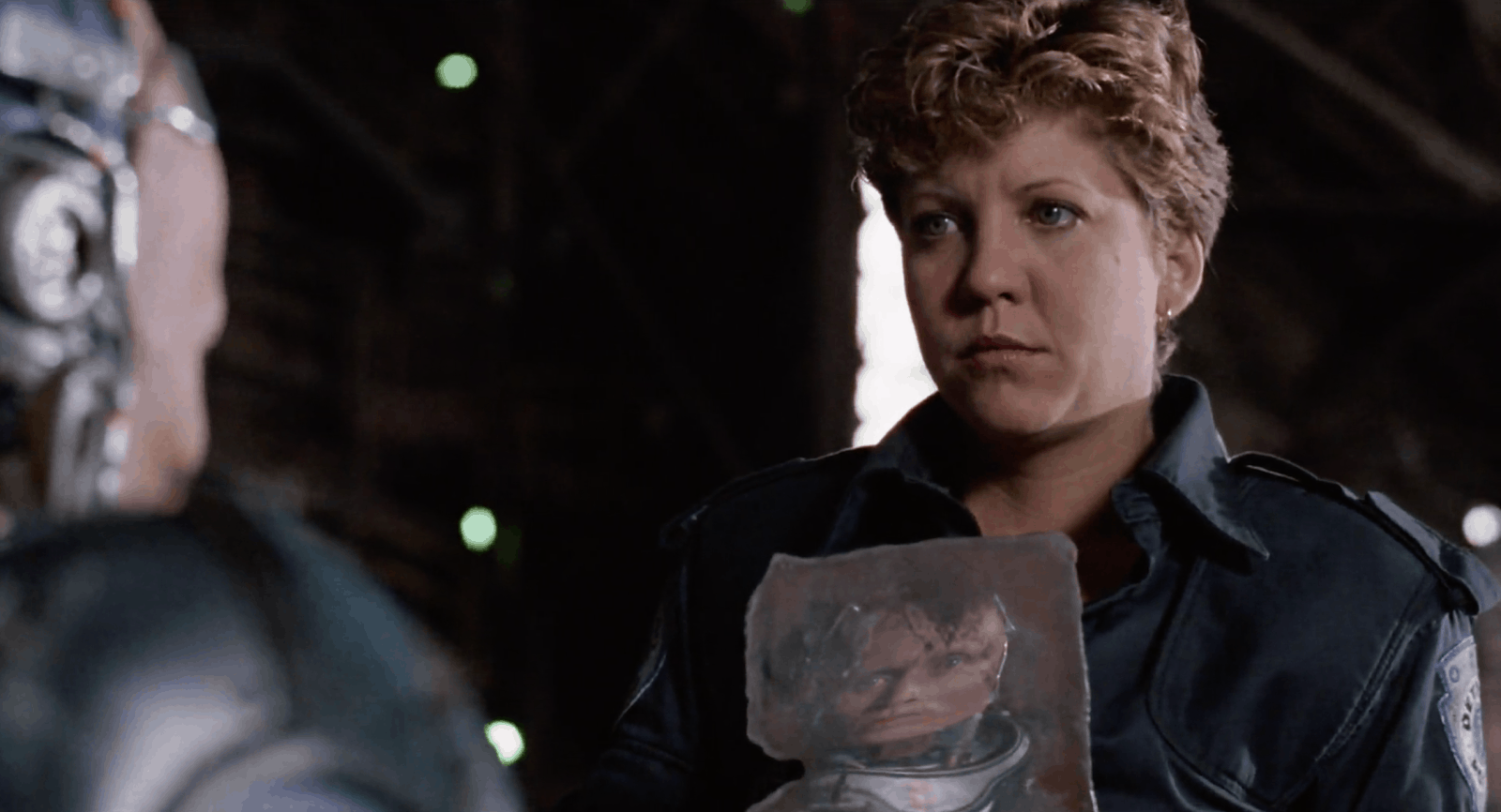
L: Total knockout performance. Nancy Allen was an inspired choice. Imagine any other actor performing the action sequences, the character work, and also popping her bubblegum.
C: While I was watching it I realized that she doesn’t have nearly as much screen time as I remembered her having, but I think that really speaks to how big an impact she makes as a character. She’s so well rounded and I love that their relationship is purely based in friendship.
L: Friendship and a recognition of shared humanity. There’s a lot to unpack in this movie politically, and that’s the lens I kind of view it through now, about policing and unions and things like that. It’s telling that she turns away from that fraternity and rescues Murphy when the rest of the force is kind of rejecting their duty.
C: As a viewer you kind of go through the same journey. To them, RoboCop just seems like a cool new toy, a killing machine, which I how I viewed him as a kid. But Lewis actually looks at him and recognizes that it’s not only a person under that armour, but her partner.
L: This movie is so economical. Murphy and Lewis spend, like, less than twenty minutes of screen time as partners before he dies, and yet that bond is so palpable. And to the killing machine point, I wanted to quickly return to my “Star Wars” comparison. This film had such a hard time passing the MPAA and getting down to an R rating. It has a body count in the dozens and has some really visceral depictions of violence and its consequences. And yet, you have something like “The Force Awakens”, this PG-rated, family fun kind of affair, which has a death toll in the billions, and its most deeply felt act of violence is the murder of a single senior citizen.
RoboCop depicts this very bleak, very accurate picture of unchecked capitalism in America, and yet, it’s a very optimistic film in some ways.
C: The violence in “RoboCop” is mind boggling horrific and it’s interesting that we see it as way more intense then a literal planet being obliterated, which happens in pretty much every “Star Wars” movie, literal genocide. But “Star Wars” ins’t really making commentary on anything which is probably why it doesn’t feel violent. Where as “RoboCop” is commenting on a lot and using over the top satire to make its points.
L: This is one of the many ways in which “RoboCop” was prescient, in predicting that our culture would be inured again to mass death. There’s a throwaway sequence in one of the media breaks stating that an orbital satellite accidentally fired onto a civilian population, killing among others, two former U.S. presidents. And then they gloss right past it.
C: The opening scene is that media break where they’re talking about Pretoria having a neutron bomb and them threatening to use it. And I was thinking man, 30 years later and this is exactly what’s going on.
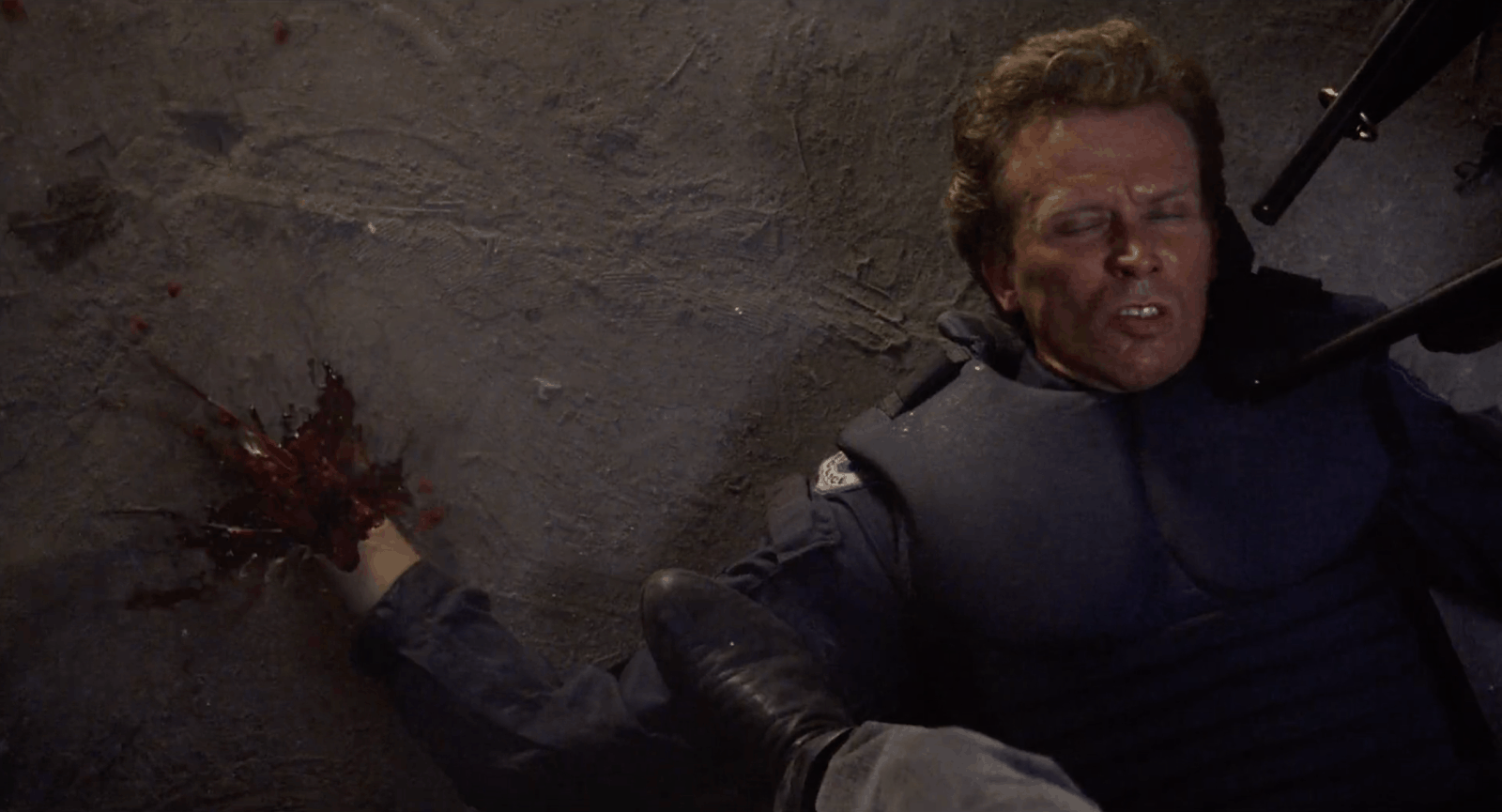
L: Yeah, it’s uncannily resonant with what’s going on today: The ascent of corporate power and neoliberalism, the bleed between the private and public sector.
C: It honestly doesn’t even feel even remotely dated. Which is great, but also sort of sad reminder of how little we’ve progressed societally when it comes to certain matters.
L: Absolutely. Another thing that I find impressive about it is that it depicts this very bleak, very accurate picture of unchecked capitalism in America, and yet, it’s a very optimistic film in some ways.
C: Yeah, there’s that line that Dick Jones says in regards to the ED – 209, something along the lines of “It doesn’t matter if it works!” Oh, here it is: “I had a guaranteed military sale with ED-209! Renovation program! Spare parts for 25 years! Who cares if it worked or not!”
L: Exactly. The lucrative military contract and the bottom line being more important than anything else. The totalizing effect of deregulation. One of the many ways I think this movie is covertly optimistic is in the form of Bob Morton, played by Miguel Ferrer. His RoboCop gambit, the creation of this incorruptible avenger, is entirely motivated by greed. He just wants to supplant Jones in the corporate hierarchy, and sees this as an opportunity to do so. It’s almost the, y’know, a broken clock is still right twice a day thing.
C: The bathroom scene between the two of them is great.
L: It’s a fantastic dynamic, and it wouldn’t work without Ronny Cox’s natural charisma and amiability. “We used to call the old man funny names… iron butt.” He’s responding entirely on the level of wounded ego, to the artifice of disrespect. Meanwhile, he’s using OCP to undermine his boss, as well as the entire city of Detroit. The forces of antagonism allayed against RoboCop are another stroke of genius.
C: It’s a huge credit to both the writing and directing that even though there are so many villains in the film, none of them feel out of place. They each add something dynamic to the story and are integral to its telling.
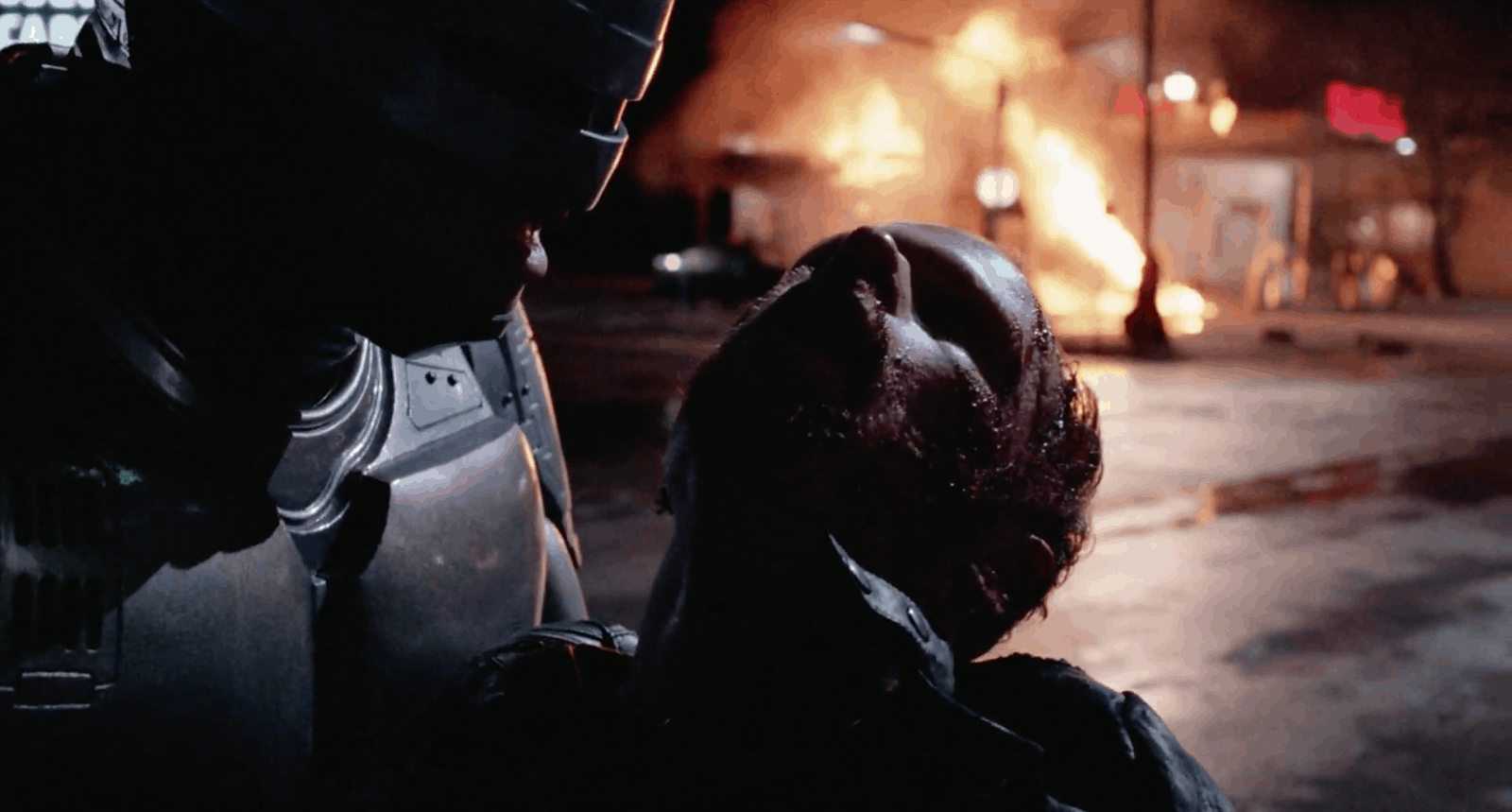
L: The “multi-ethnic gang” thing was already kind of a cliche by this point in eighties film, but I like that it’s used thoughtfully. It doesn’t feel like they’re trying to deflect accusations of racism like in movies like “Assault on Precinct 13” or “Death Wish”. I think Clarence Boddicker is a brilliant character, one of the best villains in cinema history. I’d forgotten until this last viewing that after he’s released from the police department, he appears at OCP in a suit. I love that he’s this opportunistic, proletarianized white manager. Emil, the melting gangster, has one of my favourite lines in the film: “I bet you think you’re pretty smart, huh? Think you can outsmart a bullet?”
C: Him getting basically liquified when Clarence runs him over is just such a fun moment. And that melting scene is insane and so silly.
L: It’s a unique moment, because it falls down on any deeper reading than “this is hilarious and gross.” Definitely a necessary moment of levity, but also, they really give it space to breathe. And it’s also cathartic, because Emil was one of Murphy’s murderers. Ray Wise’s character has a funny, cathartic death as well, getting taken out by Lewis after dropping rubble on RoboCop. This is, I think, one of the strengths of the movie: it’s not too cynical to provide catharsis.
C: It definitely has a really wonderful balance. It’s such a fun movie to watch but there’s also a lot of meat to it, without feeling like you’re having something rammed down your throat.
L: It’s funny and has some camp moments and scenes that are just tweaked enough in their staging to be quotable or GIF-able, but that balance is so crucial. This movie is really hard to watch at times! It’s not a, “Hey, this is hokey, let’s put it on for a laugh.”
*At this point we’d been talking for several hours so it was time to wrap it up with one final question*
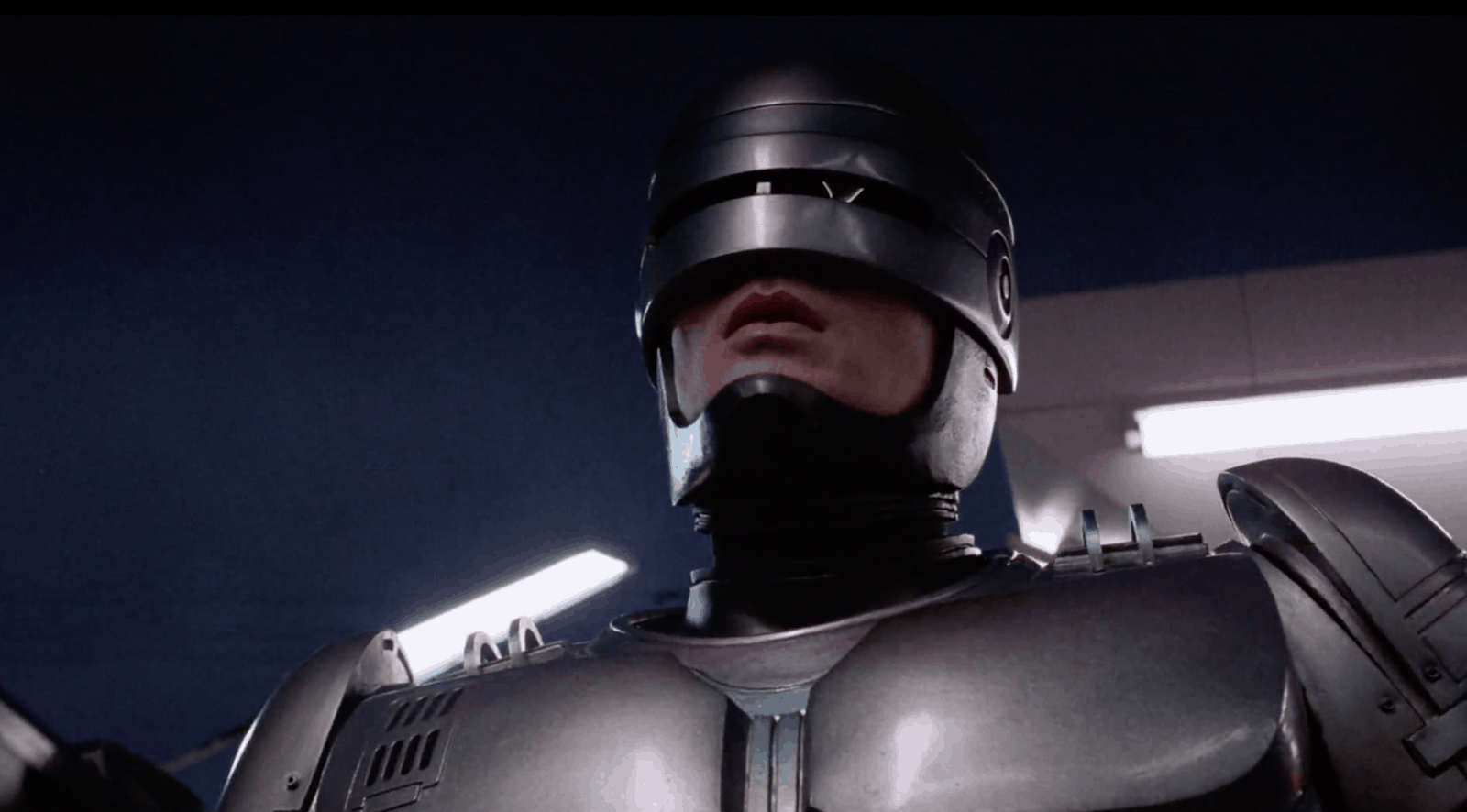
C: I was going to end off with: “What is your favourite part of the movie?”
L: I’m not sure if it plays out as one sequence or if my mind just connects the two, but the sequence that begins with Murphy’s nightmare, leading to his walk through his family’s deserted house. It’s just so heartbreaking, and features some of Peter Weller’s most evocative acting in the role. So much is communicated in the music and his pained physicality. Even in that very maudlin sequence, with the fundamental absurdity of that costume, it’s impossible not to feel something, which is, I think, a triumph.
C: That’s great! Lee, my man, thank you such much for taking part in this with me.
L: It was my pleasure. Thanks for having me!
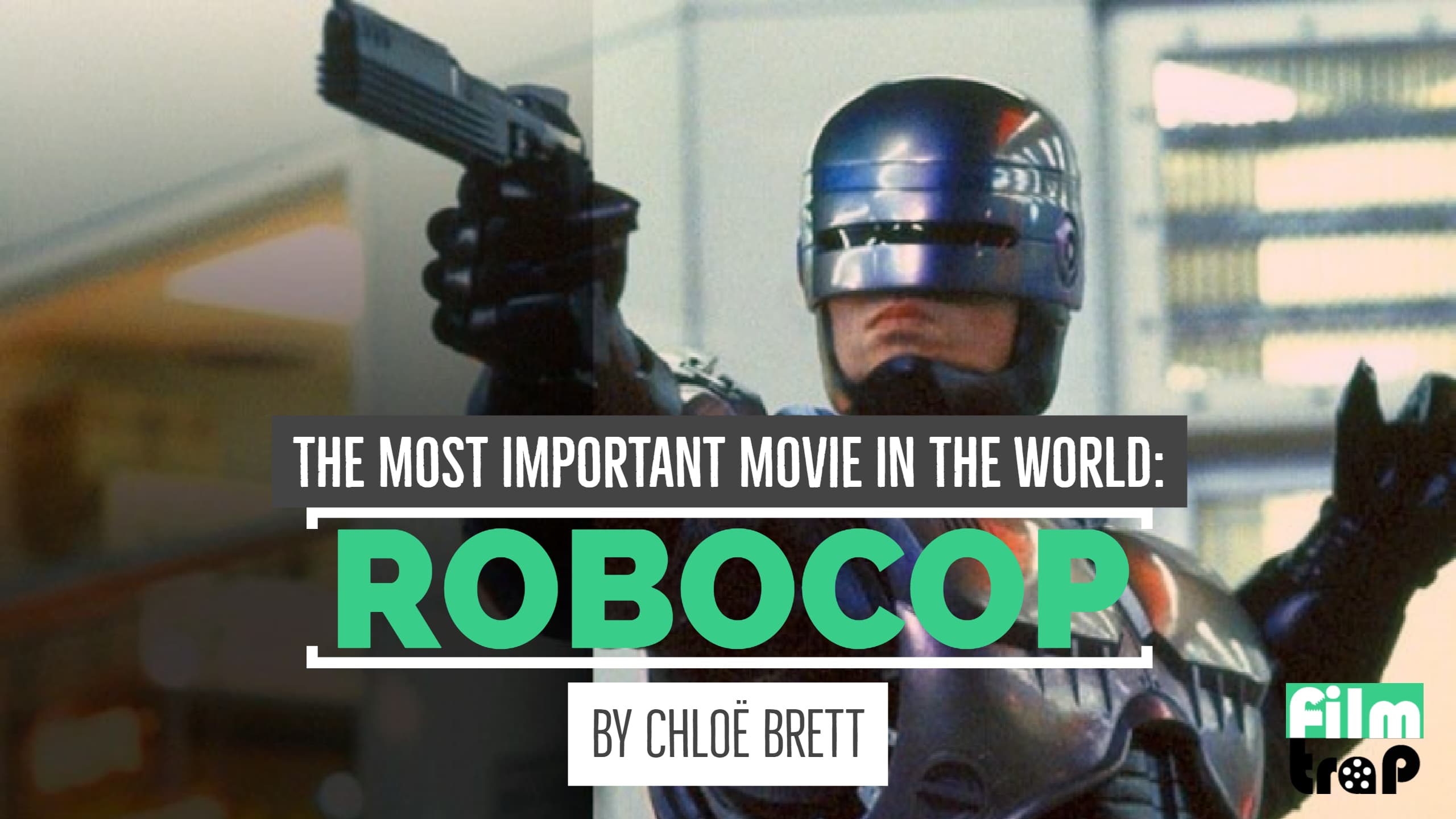
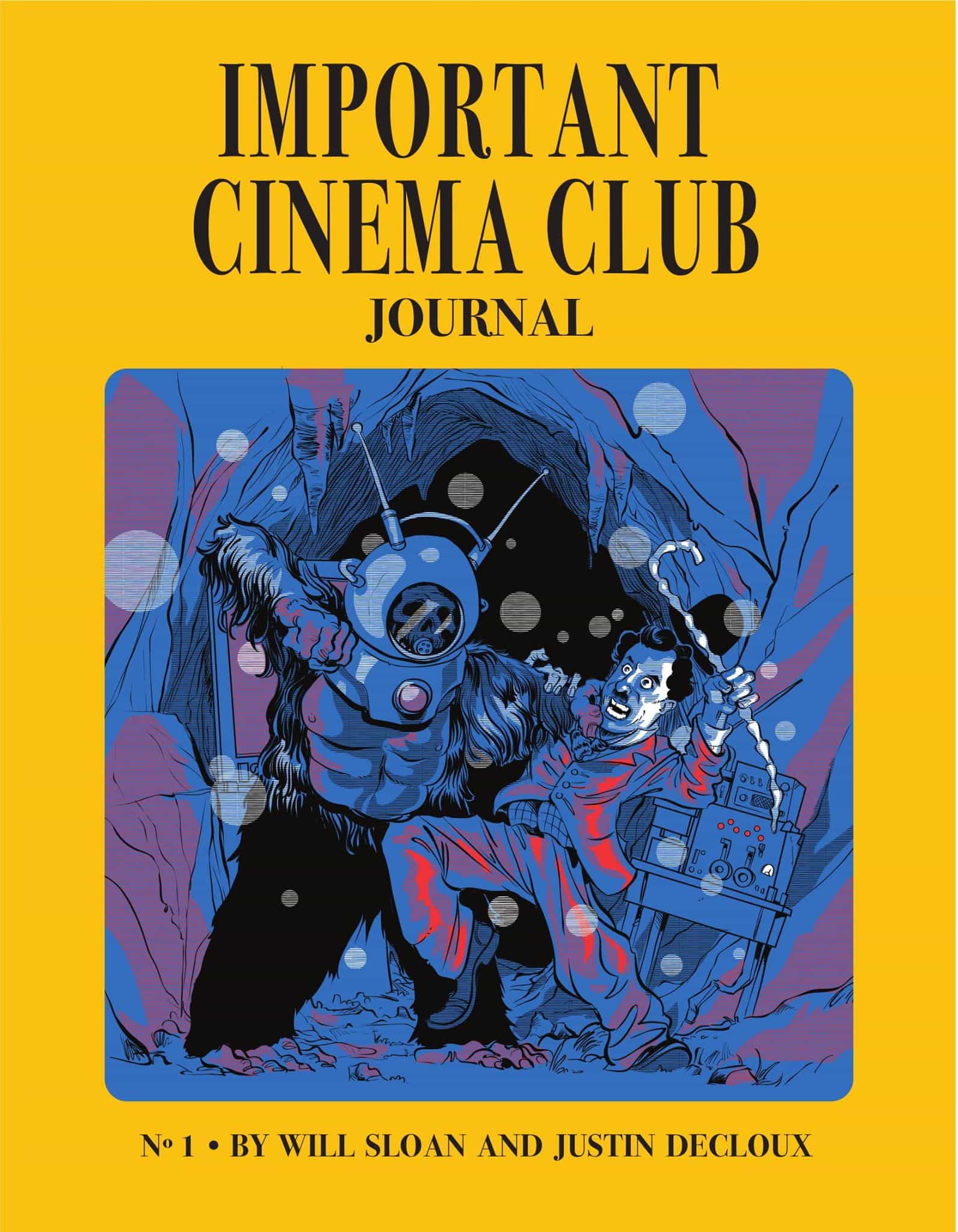




Trackbacks/Pingbacks